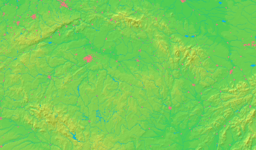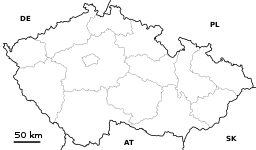Přerov
| Přerov | |||
| Town | |||
 | |||
|
|||
| Country | Czech Republic | ||
|---|---|---|---|
| Region | Olomouc | ||
| District | Přerov | ||
| River | Bečva | ||
| Elevation | 210 m (689 ft) | ||
| Coordinates | 49°27′20″N 17°27′4″E / 49.45556°N 17.45111°ECoordinates: 49°27′20″N 17°27′4″E / 49.45556°N 17.45111°E | ||
| Area | 58.50 km2 (22.59 sq mi) | ||
| Population | 44,278 (As of 2015) | ||
| Density | 757/km2 (1,961/sq mi) | ||
| First mentioned | 1141 | ||
| Mayor | Vladimír Puchalský | ||
| Postal code | 750 02 | ||
  Location in the Czech Republic | |||
| Wikimedia Commons: Přerov | |||
| Website: www.mu-prerov.cz | |||
Přerov (Czech pronunciation: [ˈpr̝̊ɛrof]; German: Prerau) is a town on the Bečva river in the Olomouc Region of the Czech Republic. Přerov is a statutory city. It had a population of 47,373 as of January 2, 2008. Přerov is about 22 kilometres (14 miles) south east of Olomouc. In the past it was a major crossroads in the heart of Moravia in the Czech Republic. It is still a major railway junction with mainlines to Prague via Olomouc, Warsaw via Ostrava, and Vienna via Břeclav, and a regional line to Brno. Today the main commercial heart of the town lies around the T.G. Masaryk Square, which is of limited architectural interest. Of greater interest is the cobbled Upper Square enclosed by historic buildings, where the Comenius Museum can be found.
History
Settlement in the locality dates back to prehistoric times. There is a world—renowned prehistoric site from the stone age on the mound called Hradisko in Přerov Předmostí. The oldest written reference to Přerov dates to 1141 when bishop Jindřich Zdík mentioned Prerov's church of St. George as one of the most important ones in Moravia. King Ottokar II of Bohemia gave Přerov the privilege of being a royal town in 1256. The mansion of Přerov, built in place of the former castle, was a residence of an influential house, the house of Pernstejn and Žerotín, from which Charles the Elder of Žerotín significantly influenced the town. Prerov also plays an important role in history of the Czech protestant church known as Jednota bratrska (Unity of the Brethren).
The town grew the most in 19th century after a railway line was built through it first from Vienna to Olomouc, later extended to Prague.
In June 1945, during the expulsion of Germans from Czechoslovakia, 71 men, 120 women and 74 children were killed in an illegal massacre of the German population.[1]
German terror in Bohemia and Moravia peaked in Spring 1945 sparking a Czech uprising, which started in Přerov on May 1 and then spread throughout the whole country after the murder of 78,154 Czech Jews and 340,000 Czech citizens during the German occupation.[2]
In Přerov there is a College of logistics, an affiliate of Tomas Bata University Zlin. The helicopter air force is based in Přerov. Currently, Přerov is the social, administrative and cultural centre of the District with developing economics.
The villages Předmostí, Lověšice, Kozlovice, Dluhonice, Újezdec, Čekyně, Henčlov, Lýsky, Popovice, Vinary, Žeravice and Penčice are administrative parts of Přerov.
People of Přerov
- Karel Janoušek (1893–1971), during World War I - Czechoslovak legions, during World War II - organized the creation of the Czechoslovak air force units in the Royal Air Force, the British granted him the rank of air marshal
- Josef Baják (1906–1980), sculptor
- David Svancer (born 1983), statistician
- Jan Blahoslav (1523–1571), developer of Czech grammar
- Abraham Placzek (1799–1884), chief rabbi of Moravia from 1847 to 1851
- Edouard Borovansky (1902–1959), ballet dancer
- Tomáš Cigánek (born 1978), footballer
- John Comenius (1592–1670), known as the father of modern education, also last bishop of the Unity of the Brethren, taught at Přerov Latin school from 1614-18, having earlier studied there
- Jarda Dokoupil (born 1981), agent of positive change
- Ctislav Doseděl (born 1970), professional tennis player
- Ida Ehre (1900–1989), actor and theatre director and manager
- Jani Galik (born 1984), footballer
- Jiřina Hauková (1919–2005), poet and translator
- Pavel Hobza (born 1946), outstanding scientist in the field of computational chemistry, one of the world's most cited chemists
- Josef Hrabal (born 1985), ice hockey player
- Vladimír Hučín (born 1952), political prisoner, secret service agent, honorary citizen of Prerov
- Josef Kainar (1917–1971), poet
- Gideon Klein (1919–1945), composer and pianist
- Eliška Kleinová (1912–1999), pianist and music educator
- Tomáš Kundrátek (born 1989), ice hockey player
- Pavel Novák (1944-2009), singer and musician
- Franz Petrasch (1744–1820) general in the Habsburg military during the French Revolutionary Wars
- Karel Plíhal (born 1958), singer and musician
- Petr Ruman (born 1976), footballer
- Kateřina Sokolová (born 1989), Miss World contestant
- František Šolc (1920–1996), French hornist and horn teacher
- Vilém Tauský (1910–2004), conductor and composer
- Rudolf Weigl (1883–1957), biologist
- Jaroslav Wykrent (born 1943), musician
- Liane Zimbler (1892–1987), architect
Sport
- HC Zubr Přerov - ice hockey club
- Sokol HC Přerov - handball club
- Zubr Cup - tennis tournament [3]
- Autoklub Přerov - motor sports club [4]
International relations
Twin towns — Sister cities
Přerov is twinned with:
External links
- Municipal website (cz)
- Prerovan.cz - Information portal for the district of Přerov (cz)
- another Přerov Website
- Comenius Museum in Přerov
- Pharmacy in Přerov (cz)
References
- ↑ Prausser, Steffen; Rees, Arfon (December 2004). "The Expulsion of the 'German' Communities at the End of the Second World War, page 18" (PDF). Department of History and Civilization. European University Institute, Florence. Retrieved 2008-12-08.
- ↑ Bažant, Jan; Bažantová, Nina; Starn, Frances (2010-12-13). The Czech Reader: History, Culture, Politics. Duke University Press. ISBN 0822347946.
- ↑ "Zubr Cup 2014 – Přerov" (in Czech). 21 June 2014. Archived from the original on 2014-11-09. Retrieved 9 November 2014.
- ↑ (in Czech)

